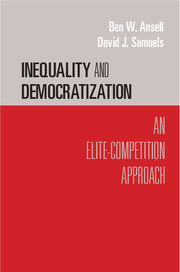
-
Select format
-
- Publisher:
- Cambridge University Press
- Publication date:
- January 2015
- December 2014
- ISBN:
- 9780511843686
- 9781107000360
- 9780521168793
- Dimensions:
- (228 x 152 mm)
- Weight & Pages:
- 0.48kg, 254 Pages
- Dimensions:
- (228 x 152 mm)
- Weight & Pages:
- 0.34kg, 254 Pages
You may already have access via personal or institutional login
Book description
Research on the economic origins of democracy and dictatorship has shifted away from the impact of growth and turned toward the question of how different patterns of growth - equal or unequal - shape regime change. This book offers a new theory of the historical relationship between economic modernization and the emergence of democracy on a global scale, focusing on the effects of land and income inequality. Contrary to most mainstream arguments, Ben W. Ansell and David J. Samuels suggest that democracy is more likely to emerge when rising, yet politically disenfranchised, groups demand more influence because they have more to lose, rather than when threats of redistribution to elite interests are low.
Awards
Winner, 2015 Woodrow Wilson Foundation Award, American Political Science Association
Winner, 2015 William H. Riker Book Award, Political Economy Section, American Political Science Association
Reviews
‘This gem of a book engages with one of the fundamental relationships in political economy: the relationship between democratization and inequality. The received wisdom is that inequality serves as a brake on democratization because the autocratic elites fear the redistributive demands of the poor median voter. Ansell and Samuels offer an illuminating new approach - the elite-competition approach - and rigorously argue that rising income inequality, in fact, fosters democratization as emerging economic groups demand political influence to insure against the old autocratic elite's power to expropriate their income and assets. The book is a major contribution to the field of political economy that will inspire and challenge researchers and students alike.'
Toke Aidt - University of Cambridge
‘[Inequality and Democratization] challenges the widely believed claim that demand for redistribution motivates democratization. Ansell and Samuels assemble very persuasive evidence to support their arguments. This is path-breaking research that will change the way social scientists think about one of the really big questions.'
Barbara Geddes - University of California, Los Angeles
‘In this book, Ansell and Samuels explicitly challenge received wisdom about democratization based on redistributive motives. These works emphasize democracy as a threat to property. Ansell and Samuels draw on ideas of liberalism and the enlightenment, such as Locke on the need to control the arbitrary behavior of governments. This approach suggests that democratization may result when property interests seek constraints on arbitrary or predatory government. Ansell and Samuels are sure to join the ranks of Acemoglu and Robinson, Boix, and Przeworski in furthering our understanding of democratization.'
Barry R. Weingast - Stanford University
‘… an important and much-needed contrition to the study of inequality and democratization … a must-read for students and scholars interested in inequality …’
Nils B. Weidmann Source: Reviews and Critical Commentary
Contents
Metrics
Altmetric attention score
Full text views
Full text views help Loading metrics...
Loading metrics...
* Views captured on Cambridge Core between #date#. This data will be updated every 24 hours.
Usage data cannot currently be displayed.
Accessibility standard: Unknown
Why this information is here
This section outlines the accessibility features of this content - including support for screen readers, full keyboard navigation and high-contrast display options. This may not be relevant for you.
Accessibility Information
Accessibility compliance for the PDF of this book is currently unknown and may be updated in the future.


